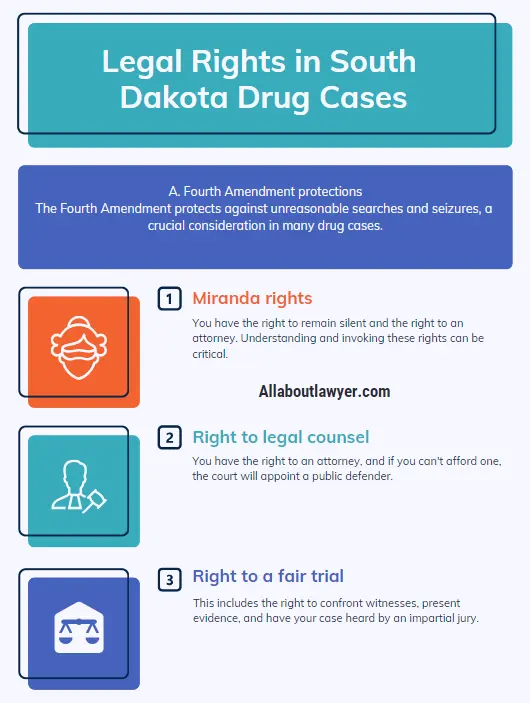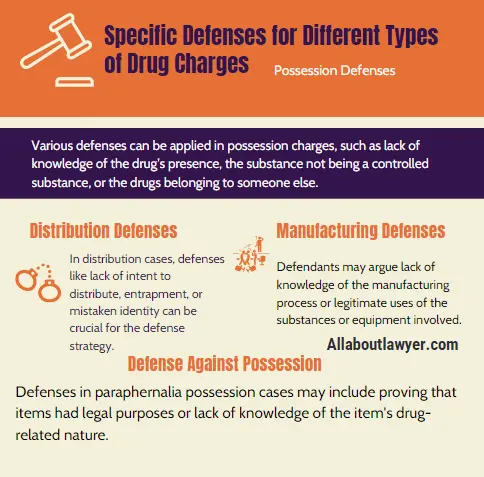How to Beat a Drug Charge in South Dakota? Legal Defenses and Strategies
South Dakota, like many states, takes a firm stance on drug-related offenses. The state’s drug laws are comprehensive and can carry severe penalties for those convicted. However, facing a drug charge in South Dakota doesn’t necessarily mean a conviction is inevitable. Understanding How to beat a drug charge in South Dakota, And available defense strategies is crucial for anyone handling this challenging situation.
Table of Contents
Overview of drug laws in South Dakota
South Dakota’s drug laws are primarily codified in the state’s Controlled Substances Act. These laws categorize illegal substances into schedules and outline penalties for various drug-related offenses, including possession, distribution, and manufacturing.
Importance of understanding legal rights and options
Knowledge is power when it comes to defending against drug charges. Understanding your rights and the potential legal strategies available can significantly impact the outcome of your case.
II. Understanding Drug Charges in South Dakota
A. Types of drug offenses
1. Possession: Having a controlled substance on your person or within your control.
2. Distribution: Selling, delivering, or intending to sell controlled substances.
3. Manufacturing: Producing or cultivating illegal drugs.
4. Paraphernalia possession: Owning items used to consume, produce, or distribute drugs.
B. Drug schedules and corresponding penalties
South Dakota, like the federal government, classifies drugs into schedules based on their potential for abuse and accepted medical use. Penalties generally increase with higher scheduled substances.
C. Aggravating factors in South Dakota drug cases
Certain circumstances can lead to enhanced penalties, such as:
– Proximity to schools or other protected areas
– Prior convictions
– Involvement of minors
– Possession of firearms during the offense

Legal Rights in South Dakota Drug Cases
A. Fourth Amendment protections
The Fourth Amendment protects against unreasonable searches and seizures, a crucial consideration in many drug cases.
B. Miranda rights
You have the right to remain silent and the right to an attorney. Understanding and invoking these rights can be critical.
C. Right to legal counsel
You have the right to an attorney, and if you can’t afford one, the court will appoint a public defender.
D. Right to a fair trial
This includes the right to confront witnesses, present evidence, and have your case heard by an impartial jury.
Common Legal Defenses for Drug Charges in South Dakota
A. Illegal search and seizure
If evidence was obtained through an illegal search, it may be suppressed and unavailable for use against you.
B. Lack of probable cause
Police must have probable cause for arrests and searches. Challenging this can be a powerful defense strategy.
C. Chain of custody issues
If the prosecution can’t prove the drugs in evidence are the same ones seized, it could weaken their case.
D. Entrapment
If law enforcement induced you to commit a crime you wouldn’t have otherwise committed, this could be a valid defense.
E. Insufficient evidence
The prosecution must prove guilt beyond a reasonable doubt. If they lack strong evidence, this could lead to acquittal or dismissal.
F. Lab testing errors
Challenging the accuracy of drug tests or the qualifications of lab technicians can be effective.
G. Mistaken identity
In some cases, you may be able to prove you were wrongly identified as the offender.
Related Articles For You:
It Is Mandatory by State Law for You to Card Everyone Who Attempts to Purchase Alcohol in Tennessee
Pre-Trial Strategies
A. Motion to suppress evidence
Filing motions to exclude illegally obtained evidence can significantly weaken the prosecution’s case.
B. Challenging the arrest
If your arrest was unlawful, it could lead to case dismissal.
C. Negotiating with prosecutors
Early negotiations can sometimes lead to reduced charges or favorable plea deals.
D. Exploring plea bargain options
In some cases, pleading to a lesser charge may be the best option to minimize penalties.
South Dakota Drug Courts and Diversion Programs
A. Eligibility criteria
These programs often focus on non-violent, first-time offenders with substance abuse issues.
B. Program requirements
Typically involve drug testing, counseling, and regular court appearances.
C. Benefits of successful completion
Can lead to reduced or dismissed charges and provide rehabilitation support.
D. Impact on charges and sentencing
Successful completion can significantly reduce legal penalties and provide a path to recovery.
Constitutional Challenges in South Dakota Drug Cases
A. Equal protection arguments
Challenging the law’s application if it disproportionately affects certain groups.
B. Due process violations
Ensuring all legal procedures were properly followed in your case.
C. Cruel and unusual punishment claims
In some cases, the potential punishment may be challenged as disproportionate to the offense.
Specific Defenses for Different Types of Drug Charges
A. Possession defenses
– Lack of knowledge of the drug’s presence
– The substance wasn’t actually a controlled substance
– The drugs belonged to someone else

B. Distribution defenses
– Lack of intent to distribute
– Entrapment
C. Manufacturing defenses
– Lack of knowledge of the manufacturing process
– The substances or equipment had legitimate uses
D. Paraphernalia possession defenses
– Items had legal purposes
– Lack of knowledge of the item’s drug-related nature
Importance of Experienced Legal Representation
A. Knowledge of South Dakota drug laws
An experienced attorney will understand the nuances of state and local laws.
B. Familiarity with local courts and prosecutors
Relationships and reputation in the local legal community can be advantageous.
C. Case evaluation and strategy development
A skilled attorney can identify the best defense strategies for your specific situation.
D. Negotiation skills
Effective negotiation with prosecutors can lead to better outcomes.
Potential Consequences of Drug Convictions in South Dakota
A. Criminal penalties (fines, imprisonment)
Penalties vary based on the offense and circumstances but can be severe.
B. Collateral consequences (employment, housing, education)
A drug conviction can impact many aspects of your life beyond legal penalties.
C. Professional license implications
Certain professions may be off-limits with a drug conviction.
D. Impact on driving privileges
Drug convictions can lead to license suspension or revocation.
Alternative Sentencing Options in South Dakota
A. Probation
Supervised release instead of jail time.
B. Community service
Performing unpaid work in the community as part of a sentence.
C. Drug treatment programs
Court-ordered rehabilitation programs.
D. House arrest
Confinement to your home as an alternative to incarceration.
Post-Conviction Options
A. Appeals process
Challenging legal errors in your trial or sentencing.
B. Expungement possibilities
In some cases, you may be able to clear your record after a certain period.
C. Sentence modifications
Petitioning for changes to your sentence under certain circumstances.
Proactive Steps to Strengthen Your Defense
A. Documenting the arrest and charges
Keep detailed records of your interaction with law enforcement.
B. Gathering witness statements
Collect statements from anyone who witnessed the events leading to your arrest.
C. Seeking character references
Positive character testimonials can sometimes influence sentencing.
D. Addressing substance abuse issues
Voluntarily entering treatment can sometimes positively impact your case.
Recent Changes in South Dakota Drug Laws
A. Legislative updates
Stay informed about any recent changes to state drug laws.
B. Relevant court decisions
Recent case law can impact how drug cases are handled.
C. Trends in drug enforcement and prosecution
Understanding current law enforcement priorities can inform your defense strategy.
Conclusion
Facing a drug charge in South Dakota is a serious matter, but with the right approach and legal representation, there are many potential avenues for defense. Understanding your rights, the specific charges against you, and the various legal strategies available is crucial. While this guide provides an overview of potential defenses and considerations, every case is unique.
The most important step you can take is to consult with an experienced South Dakota criminal defense attorney who can provide personalized advice and develop a strategy tailored to your specific situation. Remember, a charge is not a conviction, and with proper legal guidance, you may be able to achieve a favorable outcome in your case.
FAQs
What are the penalties for first-time drug offenses in South Dakota?
Penalties vary based on the type and amount of drug involved, but can include fines and imprisonment, even for first-time offenders.
Can I refuse a search of my vehicle during a traffic stop in South Dakota?
Yes, you have the right to refuse a search. However, if the officer has probable cause, they may search anyway.
How does South Dakota law handle marijuana possession charges?
South Dakota has strict marijuana laws. Even small amounts can result in misdemeanor charges with potential jail time.
What’s the difference between felony and misdemeanor drug charges in South Dakota?
Felonies generally involve larger quantities of drugs or intent to distribute and carry harsher penalties. Misdemeanors are typically for simple possession of smaller amounts.
About the Author

Sarah Klein, JD, is a former criminal defense attorney with hands-on experience in cases involving DUIs, petty theft, assault, and false accusations. Through All About Lawyer, she now helps readers understand their legal rights, the criminal justice process, and how to protect themselves when facing charges.
Read more about Sarah
